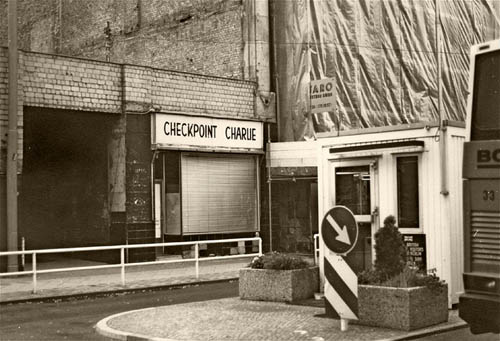 [Image: Photo by m.joedicke, via Border Town].
[Image: Photo by m.joedicke, via Border Town].
From Border Town, an independent research and design workshop to be held in Toronto this summer, from 16 June-18 August, now seeking applications:
Your farm is completely surrounded by a foreign country because the king lost it in a game of cards. You live in Cooch Behar.The workshop is organized by Tim Maly and Emily Horne, and applications are due by 2 June.
You are eating at a café when you are informed that it must close. If you’ll just shift to a table in the other country, service is still available. This café is in Baarle/Hertog.
You work in the mayor’s office. Down the hall is a parallel mayor’s office with a whole mirror set of city officials to govern the other half of your city. You work in Texarkana.
We believe that a great deal can be learned by investigating the strange edge cases of the world. Border towns are the extreme edge of where geography and politics collide. They throw the abstractions of governance into sharp physical relief. They are a fertile site for investigation into questions of security, freedom, architecture, immigration, trade, smuggling, sovereignty, and identity.
Border Town is a 10-week, multi-participant collaborative design studio that will investigate the conditions that surround life in cities situated on borders, divided by borders, or located in conflict zones. By investigating these strange specimens of political geography, we can being to think and design about the interaction of legal and physical architecture and how these forces shape the built environment and the lives of the people living in it.
By way of my own hypothetical reading list for such a course, I might suggest checking out a few of the following books: The City & The City by China Miéville, Divided Cities: Belfast, Beirut, Jerusalem, Mostar, and Nicosia by Jon Calame and Esther Charlesworth, Hollow Land: Israel's Architecture of Occupation by Eyal Weizman, City of Walls: Crime, Segregation, and Citizenship in São Paulo by Teresa P. R. Caldeira, Divided Kingdom by Rupert Thomson, A Wall in Palestine by René Backmann, and any number of other books, films, essays, and chapters elsewhere on the subjects of smuggling, demilitarized zones, police jurisdiction, international espionage, the Berlin Wall, the Jewish ghetto, quarantine, border survey teams (and the equipment they utilize), segregation and apartheid, political gerrymandering, micronations, and much more.
In any case, Border Town promises to be an interesting experience for all involved—and I should add that it's great to see people putting together this kind of independent educational workshop outside of the university system. If you end up being one of the participants, I'd love to hear how it goes.